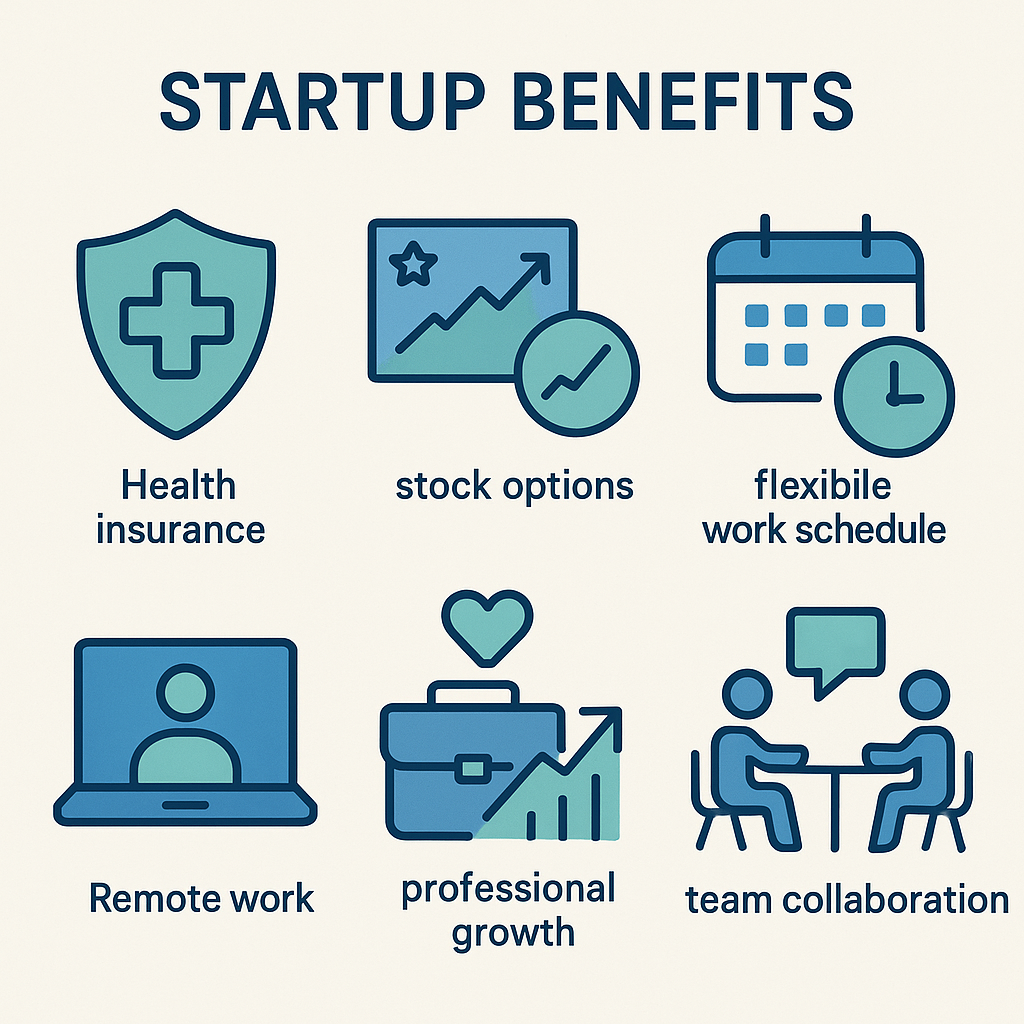Introduction
The right startup benefits are no longer just recruitment tools: they’re strategic levers for attracting, elevating, and retaining talent in 2025. In today’s competitive market, employees are not only looking for a paycheck. They want to work with companies that care about their overall experience. This means startups need to think beyond traditional perks such as free snacks or casual Fridays. Flexible work arrangements, personalized growth opportunities, and genuine support for employee well-being are becoming crucial factors in choosing an employer.
The shift towards holistic well-being reflects a larger change in workplace priorities. Employees value mental health resources, better work–life balance, and access to programs that help them feel supported both inside and outside of work. Startups that integrate these elements into their culture are more likely to build loyal and engaged teams that grow with the company.
Another key consideration is personalization. A one-size-fits-all benefits package no longer resonates with a diverse workforce. Employees appreciate options that align with their individual needs, such as customizable health plans, learning stipends for different skill sets, or flexible schedules that support their personal commitments. By giving employees more control over their benefits, startups can create a sense of trust and empowerment.
Finally, the best employee benefits for startups in 2025 are those that balance innovation with cost-effectiveness. Many startups operate under tight budgets, but they can still deliver meaningful perks by leveraging technology, partnering with third-party providers, or offering non-monetary benefits such as mentorship programs and career development opportunities. These efforts not only attract talent but also help create a strong, future-ready company culture.
Why Employee Benefits Matter for Startups in 2025
Startups face unique challenges: limited budgets, fierce talent competition, and a need to build loyalty quickly. Yet, the impact of employee benefits for startups on culture and retention has never been higher.
- Top candidates now scrutinize employee benefits as closely as salary. In today’s competitive job market, a paycheck alone is not enough to attract high-quality talent. Candidates look at how a company supports their well-being, professional growth, and overall work experience. For startups, a thoughtfully designed benefits package can be the deciding factor that convinces skilled professionals to join a smaller, fast-growing business instead of a large, established corporation. It reflects the company’s culture and its commitment to employee success, which can build trust right from the recruitment stage.
- Talent is increasingly multi-generational, with Gen Z prioritizing mental health and flexibility, while Gen X values financial security. The workforce now includes people from very different life stages, each with unique needs and priorities. Gen Z often seeks mental health support, hybrid or remote work options, and opportunities to learn new skills quickly. Millennials typically focus on career progression and work–life balance, while Gen X often places greater emphasis on retirement savings plans, insurance, and long-term stability. By understanding these differences and creating a benefits strategy that appeals to multiple generations, startups can foster an inclusive environment where everyone feels valued and supported.
- Personalized, future-focused benefits are proven to boost productivity, engagement, and loyalty: all key drivers for growth. When employees feel that their benefits align with their personal and professional goals, they are more motivated, committed, and satisfied. Startups that offer tailored perks such as learning stipends, wellness programs, flexible schedules, and mentorship opportunities often see higher levels of innovation and collaboration. These initiatives not only enhance day-to-day productivity but also strengthen retention, reducing the costs and disruptions of frequent hiring. Over time, this focus on thoughtful benefits creates a strong foundation for long-term growth.
Essential Employee Benefits for Startup Companies
1. Comprehensive Health Benefits
Health benefits for startup employees remain the single most expected perk. They not only address a fundamental need for security but also signal that the company genuinely cares about its people. A well-designed health benefits package can be a strong competitive advantage for startups looking to attract and retain top talent.
- Medical Insurance: A solid health insurance plan is often the first benefit employees look for when considering a new job. It provides peace of mind and financial protection in case of unexpected medical expenses. Startups today have more options than ever before, as global platforms offer affordable group health insurance packages that are flexible and scalable. Whether your startup is based in San Francisco, Toronto, or Vancouver, these group plans help make high-quality coverage accessible even with limited budgets.
- Mental Health Resources: The focus on mental well-being has grown significantly in recent years, especially among younger employees who expect their workplace to prioritize it. Providing access to counseling services, digital therapy platforms, or even monthly wellness stipends can make a meaningful difference. These initiatives show employees that their mental health is valued, which can lead to higher engagement and loyalty.
- Telemedicine: For startups with remote or hybrid teams, telemedicine has become a vital benefit. It allows employees to access healthcare professionals anytime and anywhere, reducing time lost to travel and making it easier to maintain consistent care. This convenience is especially valuable for small teams that need to stay productive while still taking care of their health.
Can Startups Offer Health Insurance?
Yes. Group health policies are becoming increasingly accessible for startups. Platforms like GoKlaim make it easier for companies to set up flexible, cost-sharing models that fit their budget and scale as the business grows. These solutions ensure that startups can provide meaningful coverage without facing prohibitive costs, helping them compete with larger organizations that have traditionally dominated the benefits space.
2. Flexible & Personalized Benefits
One-size-fits-all models are outdated. Today’s best employee perks for startups maximize choice and flexibility, allowing team members to feel valued as individuals rather than as part of a uniform system. When employees can access benefits that match their lifestyles, they tend to be more satisfied, engaged, and loyal to the company.
- Flexible Work Arrangements: Remote, hybrid, or asynchronous work options have moved from being a special perk to becoming a basic expectation. Startups that offer employees the freedom to choose where and when they work often see higher productivity and lower turnover. These arrangements are especially beneficial for early-stage companies looking to tap into a global talent pool without needing large physical office spaces.
- Personalized Benefit Platforms: Modern benefit platforms allow employees to pick perks that best suit their personal needs and preferences. For example, one team member might opt for pet insurance, while another might prefer a gym membership or a professional development course. Providing this kind of flexibility not only shows that the company values individuality but also helps make benefits more meaningful and impactful.
- Stipends and Allowances: Instead of offering a fixed set of perks, many startups now provide stipends or allowances. These monthly or annual budgets can be used for a wide range of categories, such as wellness programs, home office setups, learning courses, childcare, or even streaming services for personal downtime. Stipends empower employees to prioritize what truly supports their well-being and productivity.
What Are Personalized Employee Benefits?
These allow employees to select benefits or perks aligned with their lives, such as a startup wellness allowance or commuter credits, rather than limiting choice to a fixed plan. This approach creates a sense of ownership and ensures that employees feel the benefits are directly relevant to their needs, rather than being restricted to a standard, one-size-fits-all plan.
3. Financial Wellness & Retirement Options
Offering support for financial health is crucial, especially in turbulent economic times. Startups that prioritize financial wellness build trust with their teams and show a commitment to their long-term stability. These benefits not only help employees feel more secure but also position the startup as a competitive employer in a crowded market.
- Retirement Savings: Providing retirement plans such as 401(k) accounts in the United States, RRSPs in Canada, or similar local options demonstrates that a startup is thinking beyond immediate needs. Even if the employer contribution or matching is modest, offering these plans sends a powerful signal that the company cares about the future of its employees. It also helps employees build good financial habits early in their careers, strengthening their loyalty to the organization.
- Startup HSA plans & Health Spending Accounts (HSAs/HSAs Canada): These tax-advantaged accounts allow employees to set aside pre-tax dollars for medical, dental, vision, and paramedical expenses. For startups, HSAs are particularly valuable because they provide employees with autonomy over their healthcare spending without adding a significant administrative burden. By empowering employees to manage their own health-related finances, startups can offer meaningful support while keeping costs predictable and scalable.
- ESOP for startup employees & Stock Options: Equity-based benefits are a cornerstone of startup culture. Providing employees with an ownership stake through Employee Stock Ownership Plans (ESOPs) or stock options helps build a sense of shared purpose. This is especially important for early-stage companies that may not be able to match the salaries offered by large corporations but can offer long-term value and growth potential instead.
Why Do Startups Offer Stock Options?
Stock options and ESOPs turn employees into stakeholders in the company’s success. This alignment encourages them to think like owners, contributing to innovation, efficiency, and sustainable growth. For startups, offering equity also levels the playing field when competing with bigger companies for top talent. When employees see that their personal success is tied to the company’s growth, they are often more motivated and invested in achieving collective goals.
4. Employee Wellness Programs
Wellness programs for startup companies are now deeply integrated with performance, retention, and culture-building. By supporting employees’ physical, mental, and emotional health, startups can create a work environment where teams feel valued, motivated, and empowered to do their best work.
- Onsite or Virtual Fitness Classes: Fitness programs, whether conducted in person or online, encourage employees to maintain an active lifestyle. These classes can include yoga, strength training, cardio sessions, or even group challenges that build camaraderie among team members. Regular physical activity has been shown to improve focus, energy levels, and overall productivity.
- Mental Wellness Initiatives: Mental health support is increasingly expected by employees across all generations. Meditation apps, access to therapy services, and resilience or stress management workshops provide critical tools for managing workplace pressures. Offering these programs helps employees feel supported and reduces burnout, which in turn strengthens engagement and loyalty.
- Wellness Allowances: Providing an annual wellness budget gives employees flexibility to choose what supports their health and well-being. This can include fitness gear, wellness retreats, mindfulness training, or other activities that contribute to personal growth and stress reduction.
A platform like GoKlaim can streamline wellness allowance management, so teams access the best programs wherever they work.
How Do Wellness Programs Benefit Startup Teams?
Wellness programs go beyond simple perks and directly impact performance and company culture. They improve overall well-being, reduce absenteeism, and foster a sense of belonging within the team. For startups, these benefits are especially valuable because they help attract and retain motivated employees while building a positive, high-performing workplace culture. A strong wellness program can be a key factor in successfully scaling a startup.
5. Paid Time Off & Work-Life Perks
Paid time off at startups has evolved well beyond basic vacation days. Modern PTO policies recognize that rest, personal time, and work-life balance are essential for maintaining employee productivity, engagement, and overall well-being.
- Unlimited or Flexible PTO: Trust-based vacation policies allow employees to take the time they need without strict limits. This flexibility is particularly appealing to top talent who value autonomy and the ability to manage their own schedules. Employees who feel trusted to balance work and personal life are often more motivated and committed to their company. Startups that adopt flexible PTO policies also benefit from lower burnout rates and higher retention.
- Parental & Family Leave: Offering competitive leave policies for new parents, caregivers, or family emergencies demonstrates a startup’s commitment to supporting employees during important life stages. Generous parental leave, adoption support, or family care benefits foster inclusion and help build a loyal, long-term workforce. Employees are more likely to stay with a company that respects and supports their personal responsibilities.
- Volunteer/Passion Days: Providing paid time for volunteering or pursuing personal causes is increasingly valued, especially among Millennial and Gen Z employees. These days encourage employees to contribute to their communities, follow their passions, and engage in meaningful activities outside of work. Startups that offer these opportunities strengthen their culture, improve employee satisfaction, and enhance their employer brand.
6. Creative, On-Trend Perks
Distinguishing your employer brand with creative employee benefits helps startups foster happiness, loyalty, and a unique culture. Innovative perks demonstrate that the company values individuality, lifestyle choices, and the holistic well-being of its team members.
- Commuter Benefits: Transportation stipends, incentives for green commuting, or remote and hybrid setup budgets make commuting easier, cost-effective, and environmentally friendly. These benefits support employees who travel to the office regularly and make remote or hybrid arrangements more sustainable.
- Sustainability Incentives: Annual allowances for courses, certifications, coaching, conferences, or online programs empower employees to continually develop their skills. Startups that invest in employee learning not only enhance individual growth but also strengthen the collective expertise of the team, positioning the company for long-term success.
- Pet Insurance & Support: As remote work becomes more common, employees appreciate support for their home responsibilities, including pets. Pet insurance, wellness programs, or flexible schedules to care for animals show that a company understands the realities of modern life and values the personal well-being of its employees.
- Learning and Growth Budgets: Annual allowances for courses, certifications, coaching, conferences, or online programs empower employees to continually develop their skills. Startups that invest in employee learning not only enhance individual growth but also strengthen the collective expertise of the team, positioning the company for long-term success.
- Unique Lifestyle Perks: Other on-trend perks may include creative allowances for hobbies, home office enhancements, wellness apps, or personal development subscriptions. These benefits not only enhance employee satisfaction but also help startups differentiate themselves as employers who go beyond traditional offerings to create a meaningful, enjoyable workplace.
Comparison: Startup Benefits vs. Corporate Benefits
Flexibility and Personalization- Startup Benefits: High. Customizable stipends and allowances allow employees to choose benefits that fit their lifestyle and personal needs. This flexibility helps attract and retain talent who value autonomy and individuality.
- Corporate Benefits: Low. Packages are often pre-set and rigid, offering fewer opportunities for employees to tailor benefits to their preferences.
Stock Options and ESOP- Startup Benefits: Common. Equity and stock options are widely used as a recruiting tool. They align employee success with company growth and can offset lower salaries at early-stage startups.
- Corporate Benefits: Rare or reserved for executives. Most employees do not have access to equity, limiting the incentive for broader staff participation in company growth.
Health and Wellness Initiatives- Startup Benefits: Innovative. Startups offer holistic wellness programs, mental health support, telemedicine, fitness classes, and wellness allowances, often integrated with technology for easy access.
- Corporate Benefits: Standard. Coverage usually includes basic medical, dental, and vision insurance, with fewer additional wellness resources.
Remote and Hybrid Work Support- Startup Benefits: Embedded in culture. Flexible or fully remote options are common, allowing employees to work from anywhere while maintaining productivity.
- Corporate Benefits: Slow-moving. Remote work may be offered, but policies are often location-based, restrictive, or slower to adapt to employee needs.
Paid Time Off and Leave Policies- Startup Benefits: Unlimited or flexible. Startups use trust-based vacation, generous parental leave, and volunteer or passion days to support work-life balance.
- Corporate Benefits: Rigid. PTO and leave accruals are typically based on tenure, with less flexibility for taking time off as needed.
Upskilling and Learning Allowances- Startup Benefits: Common and employee-driven. Budgets for courses, certifications, coaching, and conferences allow employees to take ownership of their professional growth.
- Corporate Benefits: Less frequent and HR-driven. Learning opportunities are often standardized, limited, or required by HR rather than tailored to individual goals.
Financial Wellness Programs- Startup Benefits: Increasingly common. Options include retirement plans, health spending accounts, and financial wellness tools that help employees manage expenses and plan for the future.
- Corporate Benefits: Limited. Most programs focus primarily on retirement savings and do not provide broader financial wellness support.
Platform Advantage: Solutions like GoKlaim help startups deliver flexible, automated, and cost-effective benefits for small teams. Corporate solutions often lack adaptability, making them less appealing to younger employees, remote teams, or those seeking personalized benefits.How to Set Up Employee Benefits at a Startup
- Benchmark and Budget
Assess what other startups and large corporations are offering to understand current market standards. Use this information to set a benefits budget that aligns with your company’s growth goals and financial capacity. This ensures your offerings are competitive without overextending resources. - Prioritize Needs
Identify what employees value most by surveying your team early and often. Some may prioritize health coverage, while others may place higher importance on flexible work, wellness allowances, or learning opportunities. Prioritizing employee needs ensures that benefits deliver real impact and improve satisfaction. - Choose the Right Platforms
Select scalable benefits platforms that allow you to add, customize, and manage perks as your startup grows. Platforms like GoKlaim provide modular options that make it simple to offer health coverage, wellness allowances, learning budgets, and other benefits without administrative complexity. - Communicate Clearly
Ensure that every employee understands the value of the benefits offered and how to access them. Providing clear documentation, onboarding sessions, and regular updates helps employees make the most of the programs and reinforces the company’s commitment to their well-being. - Iterate Annually
Collect feedback and adjust benefits offerings on a yearly basis. Employee needs and market standards change over time, so flexibility and continuous improvement are essential for maximizing the return on investment of your benefits program. Regular iteration helps maintain employee satisfaction and retention while keeping the startup competitive.
Pros and Cons of Working for a Startup: Benefit Perspective
Pros:
- Flexible, Highly Personalized Benefits: Startups often allow employees to choose perks and allowances that suit their individual needs, creating a sense of autonomy and satisfaction.
- Opportunity for Ownership: Stock options or ESOPs provide employees with an ownership stake in the company, aligning personal success with company growth and offering long-term financial upside.
- Innovative Wellness Programs and Learning Budgets: Startups frequently provide holistic wellness initiatives, mental health support, fitness programs, and budgets for learning and development, helping employees thrive both personally and professionally.
- Ability to Shape Company Culture: Employees at startups can actively influence the development of workplace policies, benefit structures, and overall culture, which can make perks feel more relevant and meaningful.
Cons:
- Benefits May Be Less Robust: Health coverage, insurance options, and other traditional corporate benefits may be limited or less comprehensive compared with larger organizations.
- Limited Resources for Retirement Contributions or Niche Benefits: Startups often have budget constraints that can make long-term financial planning or specialized perks more challenging.
- Potential Volatility or Change: As startups pivot and grow, benefit offerings may change, and employees may need to adapt to evolving policies and structures.
Regional Snapshot: Startup Benefits in North America
Startup Employee Benefits in the USA:
Health plans remain a top priority for U.S.-based startups, often complemented by tax-advantaged accounts such as Health Savings Accounts (HSAs) and Flexible Spending Accounts (FSAs). Commuter perks and transportation stipends are becoming increasingly common, especially in urban areas, to support hybrid and remote employees. Equity compensation, including stock options, continues to be a core strategy for attracting and retaining talent, particularly in competitive tech hubs.
Startup Benefits in Canada:
In Canada, startups are increasingly adopting Health Spending Accounts (HSAs) and Retirement Savings Plans (RRSPs) to support employee well-being and financial security. Wellness allowances are gaining popularity, especially in major markets like Toronto, Vancouver, and Ontario, where employees expect a more holistic approach to benefits. Platforms like GoKlaim simplify management of cross-province and cross-border perks, allowing startups to provide consistent, scalable, and accessible benefits to all team members.
This regional overview shows that while specific programs may differ by country, startups across North America are focusing on flexibility, health, and personalized perks to compete with larger corporations and attract top talent.
Conclusion
To succeed in 2025, startups must move past traditional, one-size-fits-all models toward flexible, creative, and individualized employee benefits. Employees now expect more than just a paycheck. They value programs that support their physical health, mental well-being, professional growth, and work-life balance.
Innovative health and wellness coverage, generous paid time off, and ownership opportunities through equity are essential tools for attracting and retaining top talent. Allowing employees to personalize their benefits further strengthens engagement and loyalty and ensures that each team member feels valued and supported.
By designing benefits that reflect the needs and priorities of their workforce, startups can differentiate themselves from corporate competitors, build a strong company culture, and drive lasting growth. Thoughtful, flexible, and employee-centered benefits are an investment in people and in the future success of the startup itself.
Choosing the right platform partner, such as GoKlaim, ensures your benefits keep pace with your team’s needs: today and as you scale.
Frequently Asked Questions
What benefits do startups offer employees?
Startups commonly provide health coverage, flexible PTO, wellness stipends, stock options, and personalized benefits like learning budgets or commuter perks.
What are the most common startup employee benefits?
Health insurance, mental wellness programs, flexible work arrangements, stock options, and paid time off are the most frequent.
How do startups attract talented employees?
Startups attract talent with flexible benefits, opportunities for ownership, a collaborative culture, and the chance to create real impact.
Why do startups offer stock options?
Stock options align employee interests with company growth, allow sharing in long-term success, and are key to attracting competitive talent.
How to set up employee benefits at a startup?
Benchmark your market, determine priorities, budget accordingly, select a scalable platform like GoKlaim, and communicate clearly with your team.
What are the pros and cons of working for a startup?
Pros: Flexible, creative benefits and ownership stakes. Cons: Potentially smaller budgets and less robust retirement/health offerings.
Can startups offer health insurance?
Yes: group health plans and digital benefits platforms make health insurance more accessible and affordable for small startups today.
Is working at a startup good for career growth?
Often yes: Startups provide broad experience, autonomy, and faster promotional tracks, but may lack some corporate resources.
Do startups offer better benefits than corporations?
Startups excel in flexibility and personalization, but larger firms may offer broader health and retirement packages.
What are personalized employee benefits?
Customizable perks and allowances that employees choose themselves, like stipends for learning, wellness, or remote work setup.










 CompanyContact us
CompanyContact us






























